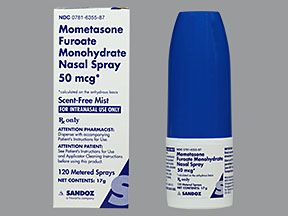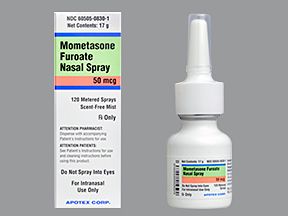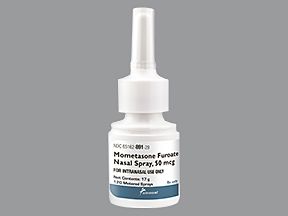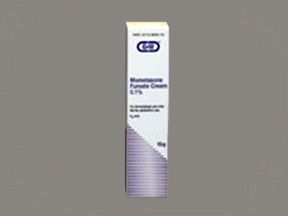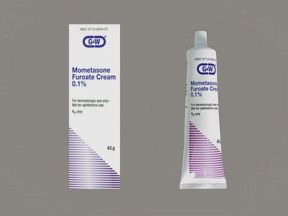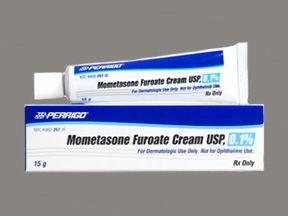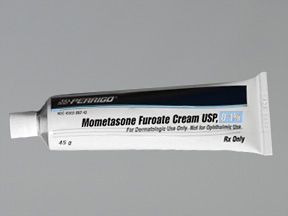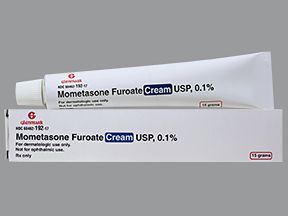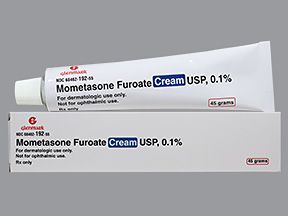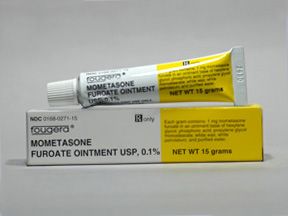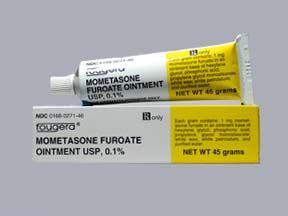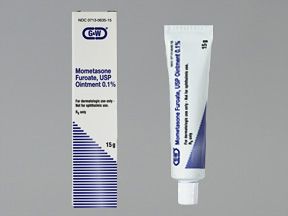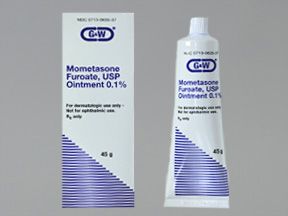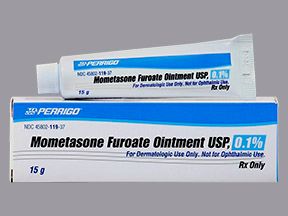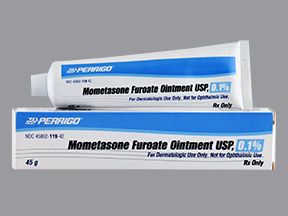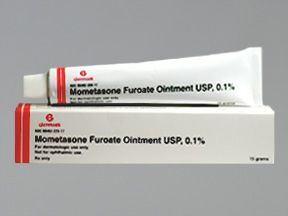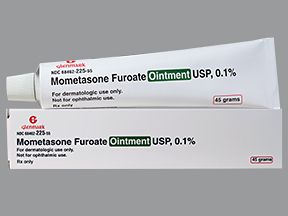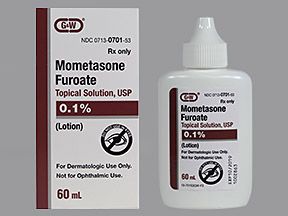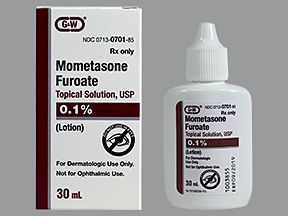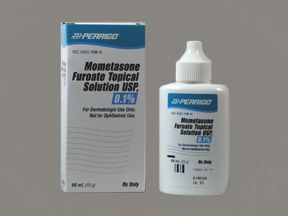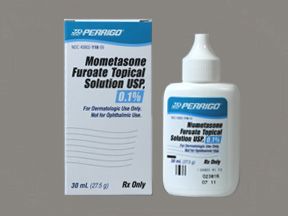Highlights for mometasone
- Mometasone nasal spray is available as a brand-name drug and a generic drug. Brand name: Nasonex.
- Mometasone is a corticosteroid that comes in six forms: nasal spray, nasal implant, inhalation powder or aerosol, and topical cream, lotion, or ointment.
- Mometasone nasal spray is used to treat or prevent allergy symptoms. It’s also used to treat nasal polyps. These are noncancerous growths in the lining of your nose or sinuses.
- Adrenal insufficiency warning: Mometasone nasal spray can cause adrenal insufficiency. That means your adrenal glands don’t make enough steroid hormones. Symptoms of this condition may occur when you stop using this drug. They can include weakness, tiredness, and low blood pressure.
- Nasal septum perforation warning: Using mometasone nasal spray for several months can cause nasal septum perforation. This means that tears or holes can occur in the flesh that divides your nostrils. Your doctor will monitor you for this problem.
- Eye problems warning: Mometasone nasal spray can cause glaucoma or cataracts. This is especially a concern for people who use this drug long term. Tell your doctor right away if you have any changes in vision, such as double vision or trouble seeing at certain angles.
Mometasone is a prescription drug. It comes in six forms: nasal spray, nasal implant, inhalation powder or aerosol, and topical cream, lotion, or ointment.
Mometasone nasal spray is available as the brand-name drug Nasonex. It’s also available as a generic drug. Generic drugs usually cost less than the brand-name version. In some cases, they may not be available in all strengths or forms as the brand-name drug.
Mometasone nasal spray may be used as part of a combination therapy. This means you may need to take it with other medications.
Why it’s used
Mometasone nasal spray is used to treat or prevent nasal symptoms of seasonal and year-round allergies. It’s also used to treat nasal polyps. These are noncancerous growths in the lining of the nose or sinuses.
How it works
Mometasone nasal spray belongs to a class of drugs called intranasal corticosteroids. A class of drugs is a group of medications that work in a similar way. These drugs are often used to treat similar conditions.
Intranasal corticosteroids work by decreasing irritation and swelling in your sinuses. They do this by stopping certain cells from producing chemicals that cause inflammation. These chemicals are normally released when your body reacts to allergens or other irritation.
Mometasone nasal spray doesn’t cause drowsiness, but it can cause other side effects.
More common side effects
The more common side effects of mometasone nasal spray can include:
- headache
- viral infection
- sore throat
- nose bleeds
- cough
If these effects are mild, they may go away within a few days or a couple of weeks. If they’re more severe or don’t go away, talk to your doctor or pharmacist.
Serious side effects
Call your doctor right away if you have serious side effects. Call 911 if your symptoms feel life-threatening or if you think you’re having a medical emergency. Serious side effects and their symptoms can include the following:
- Thrush (fungal infection in your mouth or throat). Symptoms can include:
- redness of your throat
- white patches in your throat
- Slow wound healing
- Eye problems such as glaucoma or cataracts. Symptoms can include:
- vison changes
- blurry vision
- Weakened immune system. Symptoms can include:
- fever
- pain
- aches
- chills
- tiredness
- nausea
- vomiting
- Adrenal insufficiency. Symptoms can include:
- tiredness or exhaustion
- weakness
- nausea
- vomiting
- dizziness
- fainting spells
Disclaimer: Our goal is to provide you with the most relevant and current information. However, because drugs affect each person differently, we cannot guarantee that this information includes all possible side effects. This information is not a substitute for medical advice. Always discuss possible side effects with a healthcare provider who knows your medical history.
Mometasone nasal spray can interact with other medications, vitamins, or herbs you may be taking. An interaction is when a substance changes the way a drug works. This can be harmful or prevent the drug from working well.
To help avoid interactions, your doctor should manage all of your medications carefully. Be sure to tell your doctor about all medications, vitamins, or herbs you’re taking. To find out how this drug might interact with something else you’re taking, talk to your doctor or pharmacist.
Examples of drugs that can cause interactions with mometasone are listed below.
Antibiotic
Taking clarithromycin with mometasone raises your risk of side effects from mometasone. This is because the amount of mometasone in your body may be increased.
Increased side effects can include increased risk of infection and bone mineral loss. These may only occur with long-term use of these drugs. Your doctor will likely monitor your use of this drug with mometasone.
Antidepressant
Taking nefazodone with mometasone raises your risk of side effects from mometasone. This is because the amount of mometasone in your body may be increased.
Increased side effects can include increased risk of infection and bone mineral loss. These may only occur with long-term use of these drugs. Your doctor will likely monitor your use of this drug with mometasone.
Antifungal drugs
Taking certain antifungal drugs with mometasone raises your risk of side effects from mometasone. This is because the amount of mometasone in your body may be increased.
Increased side effects can include increased risk of infection and bone mineral loss. These may only occur with long-term use of these drugs. Your doctor will likely monitor your use of these drugs with mometasone.
Examples of these drugs include:
- ketoconazole
- itraconazole
HIV drugs
Taking mometasone with certain drugs that treat HIV infection raises your risk of side effects from mometasone. This is because the amount of mometasone in your body may be increased.
Increased side effects can include increased risk of infection and bone mineral loss. These may only occur with long-term use of these drugs. Your doctor will likely monitor your use of these drugs with mometasone.
Examples of these drugs include:
- ritonavir
- indinavir
- atazanavir
- nelfinavir
- saquinavir
- products that contain cobicistat, such as darunavir/cobicistat, atazanavir/cobicistat, and elvitegravir/emtricitabine/tenofovir/cobicistat
Disclaimer: Our goal is to provide you with the most relevant and current information. However, because drugs interact differently in each person, we cannot guarantee that this information includes all possible interactions. This information is not a substitute for medical advice. Always speak with your healthcare provider about possible interactions with all prescription drugs, vitamins, herbs and supplements, and over-the-counter drugs that you’re taking.
This drug comes with several warnings.
Allergy warning
Mometasone nasal spray can cause a severe allergic reaction. Symptoms can include:
- skin rash
- itching or hives
- swelling of your face, lips, or tongue
- wheezing
If you develop these symptoms, call 911 or go to the nearest emergency room.
Don’t take this drug again if you’ve ever had an allergic reaction to it. Taking it again could be fatal (cause death).
Warning for people with liver disease
Your body may not be able to process this drug well. As a result, you may have higher levels of mometasone in your body. This can lead to increased side effects. Talk with your doctor to see if this drug is safe for you.
Warning for pregnant women
Mometasone is a category C pregnancy drug. That means two things:
- Research in animals has shown adverse effects to the fetus when the mother takes the drug.
- There haven’t been enough studies done in humans to be certain how the drug might affect the fetus.
Talk to your doctor if you’re pregnant or plan to become pregnant. This drug should be used only if the potential benefit justifies the potential risk to the fetus.
Warning for women who are breastfeeding
It’s not known whether mometasone passes into breast milk and causes side effects in a child who is breastfed. Talk to your doctor if you breastfeed your child. You may need to decide whether to stop breastfeeding or to stop taking this medication.
Warnings for children
- Mometasone nasal spray can decrease the growth rate in children. To avoid this side effect, your child should receive the lowest dosage that controls their symptoms. Your child’s doctor will likely monitor your child’s growth regularly during treatment with this drug.
- Mometasone nasal spray is more likely to cause adrenal insufficiency in children than in adults.
- Mometasone nasal spray should not be used in children younger than 2 years.
All possible dosages and drug forms may not be included here. Your dosage, drug form, and how often you take the drug will depend on:
- your age
- the condition being treated
- the severity of your condition
- other medical conditions you have
- how you react to the first dose
Drug form and strength
Generic: Mometasone
- Form: nasal spray
- Strength: 50 mcg
Brand: Nasonex
- Form: nasal spray
- Strength: 50 mcg
Dosage for nasal symptoms of allergies
Adult dosage (ages 18 years and older)
- Nasal symptoms of year-round and seasonal allergies: Use two sprays in each nostril once per day.
- Prevention of seasonal allergies: Use two sprays in each nostril once per day. Start using mometasone spray two to four weeks before the anticipated start of pollen season.
Child dosage (ages 12–17 years)
- Nasal symptoms of year-round and seasonal allergies: Use two sprays in each nostril once daily.
- Prevention of seasonal allergies: Use two sprays in each nostril once daily. Start using mometasone spray two to four weeks before the anticipated start of pollen season.
Child dosage (ages 2–11 years)
- Nasal symptoms of year-round and seasonal allergies: Use one spray in each nostril once daily.
Child dosage (ages 0–1 year)
Mometasone nasal spray is not approved for use in children younger than 2 years of age.
Dosage for nasal polyps
Adult dosage (ages 18 years and older)
Use two sprays in each nostril twice per day.
Child dosage (ages 0–17 years)
Mometasone has not been shown to be safe and effective for use in people younger than 18 years of age for the treatment of nasal polyps.
Disclaimer: Our goal is to provide you with the most relevant and current information. However, because drugs affect each person differently, we cannot guarantee that this list includes all possible dosages. This information is not a substitute for medical advice. Always speak with your doctor or pharmacist about dosages that are right for you.
Mometasone nasal spray is used for short-term treatment. It comes with serious risks if you don’t take it as prescribed.
If you stop taking the drug suddenly or don’t take it at all: Your condition may not improve and may get worse.
If you miss doses or don’t take the drug on schedule: Your medication may not work as well or may stop working completely. For this drug to work well, a certain amount needs to be in your body at all times.
If you take too much: You could have high levels of the drug in your body. Symptoms of an overdose of this drug can include:
- tiredness
- depression
- anxiety
- hunger
- excessive sweating
- flushing
- high blood pressure
- bruising easily
- trouble sleeping
If you think you’ve taken too much of this drug, call your doctor or local poison control center. If your symptoms are severe, call 911 or go to the nearest emergency room right away.
What to do if you miss a dose: Take your dose as soon as you remember. But if you remember just a few hours before your next scheduled dose, take only one dose. Never try to catch up by taking two doses at once. This could result in dangerous side effects.
How to tell if the drug is working: Your condition should improve. Talk to your doctor if your condition gets worse.
Keep these considerations in mind if your doctor prescribes mometasone for you.
General
- Take this drug at the time(s) recommended by your doctor.
Storage
- Store this drug at room temperature between 68°F and 77°F (20°C and 25°C).
- Don’t store this medication in moist or damp areas, such as bathrooms.
- Store this drug away from light.
Refills
A prescription for this medication is refillable. You should not need a new prescription for this medication to be refilled. Your doctor will write the number of refills authorized on your prescription.
Travel
When traveling with your medication:
- Always carry your medication with you. When flying, never put it into a checked bag. Keep it in your carry-on bag.
- Don’t worry about airport X-ray machines. They can’t harm your medication.
- You may need to show airport staff the pharmacy label for your medication. Always carry the original prescription-labeled container with you.
- Don’t put this medication in your car’s glove compartment or leave it in the car. Be sure to avoid doing this when the weather is very hot or very cold.
Clinical monitoring
Your doctor will likely monitor certain health issues during your treatment. This can help make sure you stay safe while taking this drug. These issues can include:
- Growth rate. Your child’s doctor will monitor your child’s growth to make sure this drug is not affecting it.
- Cortisol levels. This drug may cause adrenal insufficiency, which occurs when your body doesn’t produce enough of certain hormones such as cortisol. Your doctor may monitor your cortisol levels to make sure this drug isn’t causing adrenal insufficiency.
Prior authorization
Many insurance companies require a prior authorization for this drug. This means your doctor may need to get approval from your insurance company before your insurance company will pay for the prescription.
There are other drugs available to treat your condition. Some may be better suited for you than others. Talk to your doctor about other drug options that may work for you.
Disclaimer: Healthline has made every effort to make certain that all information is factually correct, comprehensive, and up-to-date. However, this article should not be used as a substitute for the knowledge and expertise of a licensed healthcare professional. You should always consult your doctor or other healthcare professional before taking any medication. The drug information contained herein is subject to change and is not intended to cover all possible uses, directions, precautions, warnings, drug interactions, allergic reactions, or adverse effects. The absence of warnings or other information for a given drug does not indicate that the drug or drug combination is safe, effective, or appropriate for all patients or all specific uses.

